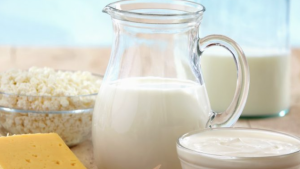I’ve lost count of the number of people I’ve met who’ve given up eating dairy products when diagnosed with cancer, especially breast cancer. The notion that dairy products are deeply implicated in cancer development is pervasive and hard to shift, but really unfounded on the evidence!
Low fat dairy foods are a good source of biologically rich protein and high in bio-available forms of calcium. Extensive reviews of the scientific evidence have not found any suggestive links between dairy and breast cancer risks.
There are also many benefits to including dairy in the diet. They provide a valuable and available source of calcium in the diet and this is important if you are at risk of osteoporosis or starting hormonal treatments.
Dairy foods have one of the highest quality sources of protein which is far superior to soya equivalents or almond milk. It is a source of an important amino acid leucine which is taken by many athletes to help with strength and muscle weight gain and this is important during treatment. Dairy foods are also the best source of bioavailable calcium important for the bones, especially in those who are at risk of osteoporosis which is all women who were diagnosed either at a premenopausal or menopause age.
The concerns around dairy products seem to relate to a belief that intensive farming methods increase exposure to hormones, and that somehow this definitely explains the breast cancer increases. This is unlikely to be the case in Australia as bovine growth hormones are banned by our food authorities and natural intakes due to use of pregnant bovines are minute. Furthermore, these substances are proteins and are broken down in the acidic environment of the stomach, so actual amounts that might be absorbed are negligible, certainly compared to amounts taken in from hormone sources such as contraceptive pills.
Other theories have stemmed from population studies between Western and Asian (ie US versus Japanese women) cultures, which broadly examined breast cancer rates along with a spectrum of lifestyle and diet differences. One of the reasons proposed for the higher rate of breast cancer in Western women was the dairy intake. However, there are so many more differences between these populations, including levels of fat intake, energy intake, fish intake, activity, genetics and alcohol intake. These along with many more factors could equally be pinpointed as possible causes.
Finally, a number of case controlled studies has not found any link; in fact, at this point the research is leaning toward an actual lower risk in individuals who are higher dairy consumers. (Harvie 2006, Zang 2015).
If you are intolerant to lactose - which is common with any treatment which may affect the gut lining - it may be worth trying a lactose-free milk or yoghurt.
This is available in the supermarket chill section alongside the regular milks. People who have a degree of lactose intolerance also tend to manage some cheese and small amounts of yoghurt. Cottage cheese is also a whey-rich protein source and some research indicates whey protein again may be more beneficial to weight and muscle gain.
The recommend intake of dairy in the diet is 3-4 serves a day. A serve is a 250ml glass of milk, a milk coffee, a slice of cheese or a small tub of yoghurt. If you do want to avoid diet discuss with your doctor or dietitian how you can ensure that your dietary calcium requirements are met.
